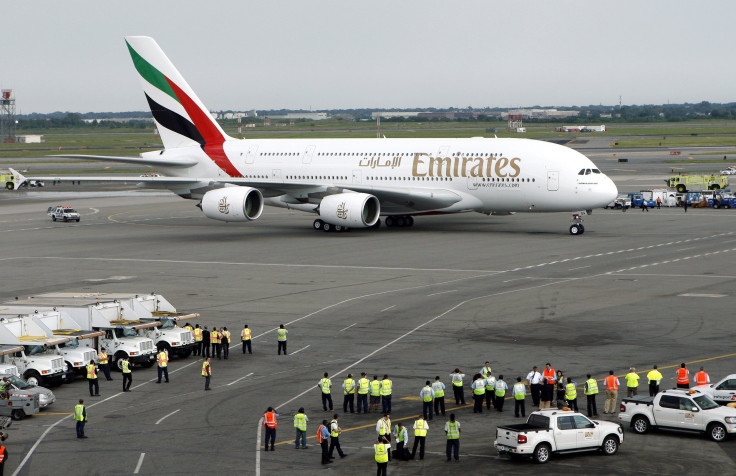As Gulf Airlines Grow, US Carriers Fight Back

Emirates, the fourth-largest airline in the world by number of passengers carried internationally, has been flying high -- and it’s about to soar a little higher. Its holding company, Emirates Group, announced Tuesday it plans to add 11,000 staffers across the airline’s worldwide operations by March 2016.
The Dubai-based airline is adding several new routes and expects to take delivery of more than 20 new planes this year, necessitating the addition of staff worldwide.
That’s in stark contrast to American legacy carriers such as United Airlines, which is considering outsourcing more than 2,000 jobs. Its parent United Continental Holdings Inc. and a couple of other big U.S. carrier companies, American Airlines Group Inc. and Delta Air Lines Inc., aren’t exactly thrilled with Emirates’ explosive growth.
“The Gulf carriers are credible competitors offering a good product, good price and convenient connections, making long-distance travel very efficient and even pleasant,” said airline industry analyst Henry Harteveldt.
Indeed, Emirates, Etihad Airways and Qatar Airways have been successful in snatching business from the three major legacy carriers in the U.S.
Bookings on American airlines from the U.S. to destinations in South and Southeast Asia and even parts of Europe have declined by about 5 percentage points since 2008, thanks to competition from Gulf carriers, Reuters reported. The news agency obtained a white paper Wednesday issued by the American airline industry to the White House and the cabinet departments of Transportation, State and Commerce detailing the fall of the U.S. carriers’ market share and the rise of their rivals’ in one of the world’s fastest-growing air-traffic areas.
According to the report obtained by Reuters, the combined bookings share of United Airlines, Delta Air Lines and American Airlines between the U.S. and the Indian subcontinent fell to 34 percent in 2014 from 39 percent in 2008. Meanwhile, the combined bookings share of Emirates, Etihad and Qatar in the same market soared to 40 percent in 2014 -- from a lowly 12 percent in 2008.
The decline in market share is among the chief reasons U.S. carriers have been lobbying the Obama administration to roll back “open skies” agreements with Qatar and the United Arab Emirates that allow them to operate from destinations in the U.S. Changes could include restricting the number of cities Gulf carriers can operate in or limiting flight frequency and capacity.
The CEOs of American, Delta and United told the Wall Street Journal in a joint interview last week that the three Gulf airlines receive governmental subsidies from Qatar and the UAE that offer an unfair advantage to the Middle Eastern airlines and “distort global transportation.” The executives alleged the three airlines received $42.3 billion in quantifiable subsidies since 2004, excluding other benefits such as corporate tax exemptions and spending on airport infrastructure.
Emirates CEO and President Tim Clark flatly denied the allegation. “We have never received financial subsidies or bailouts,” Clark said. “We did receive startup capital of $10 million in 1985 and a one-time infrastructure investment of $88 million for two Boeing 727 aircraft and a training building.”
But Peter Morris, an economist at the global flight consultancy Ascend, told the National that while subsidies did not exist, the Gulf carriers do reap other financial benefits.
“A while back, UBS looked at the books of Emirates and they came to the conclusion that they were straightforward. There wasn’t any subsidy of any sort,” Morris said. However, he added: “There is a competitive advantage for Gulf carriers in not having an income tax. There is an advantage to running your economy without income tax.”
But Emirates Chairman Sheikh Ahmed Bin Saeed Al Maktoum said there’s a more obvious reason for Gulf carriers’ success: a superior product. “Offer the best to the passengers, and people will fly with you,” he told Bloomberg Business. “They don’t mind paying maybe an extra penny to fly if your service is good, at the end of the day it is all about service.”
Analyst Harteveldt agreed. “To a certain degree, it’s just sour grapes on part of the American airline industry,” he said. “Passengers are going to pick the better experience.”
Still, Harteveldt is not completely unsympathetic to the plight of the U.S. legacy carriers. “They do have some legitimate concerns. Nobody objects to losing in a fair fight, but the key thing is it has to be fair,” he said. Gulf carriers aren’t subject to the same wage regulations as American carriers are, according to the analyst, and it’s possible they can afford to take losses on certain routes to expand their businesses -- a luxury that shareholder-bound American carriers don’t have.
But, Harteveldt said, they are still capable of turning around their own fortunes. “The airline business is a very tough one, and passengers are fickle,” he said. “The U.S. carriers have to deliver the product the consumer wants.”
© Copyright IBTimes 2025. All rights reserved.





















